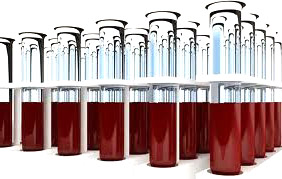Understanding of a blood report blood
 Published: 25 Aug 2024
Published: 25 Aug 2024
Understanding Blood Reports
Blood reports provide valuable insights into your overall health. Here's a breakdown of key components:
1. Complete Blood Count (CBC)
- Red Blood Cells (RBC): Measure oxygen-carrying capacity. Abnormalities may indicate anemia.
- Hemoglobin (Hb): Carries oxygen in red blood cells. Low levels suggest anemia.
- Hematocrit (Hct): Percentage of blood volume occupied by red blood cells. Deviations may indicate anemia or other issues.
- White Blood Cells (WBC): Indicate infection or inflammation. High/low levels may suggest blood disorders.
- Platelets: Aid in blood clotting. Abnormal levels may point to clotting disorders or bone marrow issues.
2. Basic Metabolic Panel (BMP)
- Glucose: Assesses blood sugar levels. High levels may indicate diabetes.
- Calcium: Supports bone health and muscle function. Abnormal levels may relate to bone or parathyroid issues.
- Electrolytes: Regulate heart, muscle, and nerve function. Imbalances can affect these systems.
3. Comprehensive Metabolic Panel (CMP)
- Liver Enzymes: Indicate liver health. Abnormal levels may suggest liver damage or disease.
- Kidney Function: Measures creatinine and BUN. High levels may indicate kidney dysfunction.
4. Lipid Panel
- Cholesterol: Assesses cardiovascular risk. Includes total, LDL (bad), HDL (good), and triglycerides.
5. Thyroid Function Tests
- TSH: Indicates thyroid gland function. Abnormal levels may point to thyroid disorders.
- T3 and T4: Thyroid hormones that regulate metabolism. Abnormal levels may indicate thyroid dysfunction.
6. Hemoglobin A1c (HbA1c)
- Long-Term Glucose Control: Measures average blood sugar levels over time. Crucial for diabetes management.
Interpretation of Results
- Compare Values: Check test results against reference ranges. Deviations may indicate potential health issues.
- Consult with Healthcare Provider: Discuss results with a healthcare professional to determine implications and appropriate steps.
Conclusion
Understanding blood reports requires reviewing parameters and comparing them to reference ranges. Consulting a healthcare professional is essential for accurate interpretation and personalized guidance.
 Published: 25 Aug 2024
Published: 25 Aug 2024